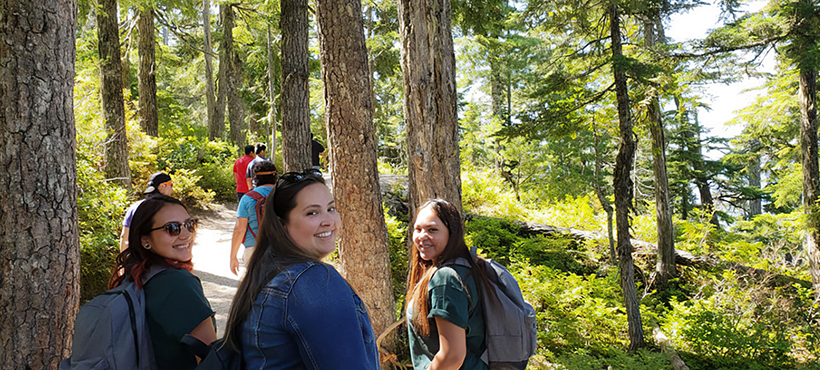
What are Indigenous Knowledge Learning Outcomes (IKLOs)?
IKLOs are Indigenous-focused learning outcomes that will help all learners, regardless of their chosen field of study, better understand Indigenous Peoples, histories, cultures, and realities by the time they graduate. IKLOs are an opportunity to decolonize curriculum and education and to make education safe for those underrepresented, such as Indigenous learners.
What are the purposes of IKLOs?
The goal is to embed IKLOs within programs of study throughout the Mohawk College, so by the time a student graduates any program they will learn about First Nations, Inuit, and Métis Peoples.
Implementation of IKLOs are an effective and meaningful method for Mohawk College to achieve all of its commitments to Indigenous Education and the college’s Strategic Plan 2022-2025 directions to “Meaningfully advance Truth and Reconciliation.” This method has precedent, and the Mohawk College model is based on two years of consultation both inside and outside the institution.
Our IKLOs
- Explore and reflect on the contributions of Indigenous Peoples to the world.
- Demonstrate the importance of Indigenous relationships with the Land, Creation, agreements and treaties between Indigenous and non-Indigenous communities.
- Apply principles and practices of Indigenous Knowledge to career field.
- Explore, appreciate and understand Indigenous Peoples’ histories, worldviews, cultures, creativity and ways of knowing and being.
- Analyze and reflect on structures of privilege and the impact on Indigenous Communities.
- Create personal and systemic commitments for Reconciliation with Indigenous Peoples.
Design and demonstrate solutions for present-day realities informed by Indigenous concepts of relationships and sustainability.
How will it work?
IKLOs will be embedded into curriculum systemically through the Academic Planning Cycle: New Program Development and Program Review. CIRKL and CTLI are working in partnership to support faculty with the implementation process.
What supports are available?
IKLO program implementation checklist PDF to guide you through the steps to implement IKLOs
CIRKL IKLO implementation approval form PDF to submit when you would like final approval to start implementing your selected IKLOs
- ela.smith [at] mohawkcollege.ca (Ela Smith) - Professor, Teaching and Learning Consultant - Indigenous Education, CTLI for an introduction to IKLOs
- jessica.pearce [at] mohawkcollege.ca (Jessica Pearce) – Professor, Indigenous Curricula and Programs for IKLO implementation
- Professional Development opportunities, Centre for Teaching, Learning & Innovation
- Please reach out if you have any questions or feedback by emailing cirkl [at] mohawkcollege.ca (cirkl[at]mohawkcollege[dot]ca)
Implementation Plan
Phase 1-College Programs seek an Introduction to the IKLOs
Phase 2-College Programs Choose the IKLOs they would like to implement in their program/courses
Phase 3-College programs seeks support to Review their IKLO plan
Phase 4-College programs completes and submits the CIRKL IKLO Implementation plan form to CIRKL for Approval
Phase 5-The program begins to Implement the IKLOs and participates in 3 Annual Check-ins of their IKLOs implementation
What are IKLOs supported by?
Mohawk College’s Strategic Plan (2022-2025)
“Commit to including Indigenous knowledge, culture and history in all areas of the college experience, both inside and outside the classroom, including the integration of Indigenous Learning Outcomes into programs of studies throughout the college” (Mohawk College, 2021).
The Indigenous Education Protocol (2014)
Launched by Colleges and Institutes of Canada in 2014, the Indigenous Education Protocol was signed by 67 institutions across Canada, including Mohawk College, all committing to “...make Indigenous education a priority” and “... implement intellectual and cultural traditions of Indigenous Peoples through curriculum..." (Colleges & Institutes Canada, 2014).
The Truth and Reconciliation Commission of Canada: Calls to Action
62 - ii: “...Educate teachers on how to integrate Indigenous knowledge and teaching methods into classrooms” (The Truth and Reconciliation Commission of Canada, 2015, p. 7).
63 - iii: “Sharing information and best practices on teaching curriculum related to residential schools and Aboriginal history" (2015, p. 7).
References
- CIRKL IKLO Consultation Report (2023) PDF (1.4mb)
- Colleges & Institutes Canada. (n.d.). Indigenous Education Protocol for Colleges and Institutes.
- Mohawk College. (2021). Mohawk College Strategic Plan 2022 – 2025 at a glance.
- The Truth and Reconciliation Commission of Canada. (2015). Truth and Reconciliation Commission of Canada: Calls to Action

